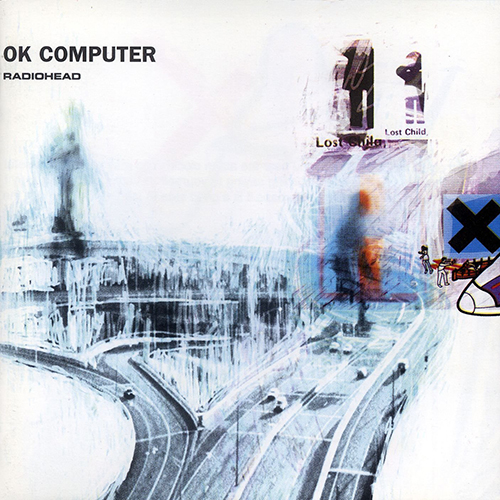OK Computer
- 3 Aug 2017
- Even non-fans of Radiohead can respect the craftsmanship and commentary of the band's most famous album.

OK Computer has recently turned 20 years old and to celebrate the occasion, I’m writing this post and listening to this album. Along with Michael Jackson’s Thriller and Nirvana’s Nevermind, Radiohead’s third album is a monumental work of music that has been created in my lifetime. I’m old enough to remember the hype at the time, especially one commercial with a robotic voice like the one in “Fitter Happier.”
I’m not a big Radiohead fan; I haven’t listened to any of their work after OK Computer, and I might listen to it only a handful of times every year. I think of it as a novel or a collection of short stories, so I don’t need to experience it every day or every week. Most of the songs are instantly recognizable to me, though. I think the irony, and maybe the intention, of the songwriting is that the memorable parts are acoustic, despite the name of the album.
I’m a visually oriented person, so of course, I’ve always appreciated the music videos for the singles.
“Paranoid Android”
The surreal cartoon by Magnus Carlsson makes as much sense as the six-and-a-half-minute song, but the former is one reason why the latter is so iconic. I was captivated by the edginess of the video when I first saw it.
“Karma Police”
The continuous take, or at least the impression of it, could be the inspiration for a certain scene in Alfonso Cuaron’s Children of Men. In any case, the video is directed by Jonathan Glazer whose other work includes the similarly themed Jamiroquai video.
“No Surprises”
This video by Grant Gee is my favorite of the three. The visual trickery is effective; Thom Yorke is not subject to being submerged for that long. He is, however, subject to a congenital drooping eyelid and British oral hygiene.
Romeo + Juliet
Baz Luhrman’s 1996 interpretation of Shakespeare’s tragedy isn’t that great, but it does feature “Exit Music (For a Film)” during its end credits. The haunting lyrics fit the movie, which is on my mind partly because I’ve been watching Claire Danes in Homeland.
Legacy
Besides having a lot of distinct songs, OK Computer is celebrated because it reflects the zeitgeist of the mid- to late-90s. Specifically, the album is about being disconnected and dissatisfied in spite of promised connectedness and convenience. These anxieties and fears were well represented at the time, when the new millennium was a few years away and the Worldwide Web was several years old.
Radiohead’s opus being relevant and their warnings being realized, 20 years later, isn’t surprising. Critics who write about others predicting the former and Radiohead predicting the latter are overstating things. Even with hindsight, the lasting relevance and eventual realization of OK Computer would’ve been foregone conclusions to anybody with half a mind for these topics.
OK Computer OKNOTOK 1997-2017 is a remastered version of the album that includes an album’s worth of B-sides. I don’t plan to buy or even listen to it, except for maybe “Palo Alto,” which is obviously named for the epicenter of digital technology. Even if the previously unreleased 12 songs are good, they can’t match the original 12 songs. The Library of Congress agrees: they’ve preserved OK Computer in the National Recording Registry.
I’m trying to learn Jonny Greenwood’s lead-in to the chorus in the first part of “Paranoid Android,” via Rocksmith 2014, and looking for a nice t-shirt that prominently features the words, “Kicking, screaming Gucci little piggy.”